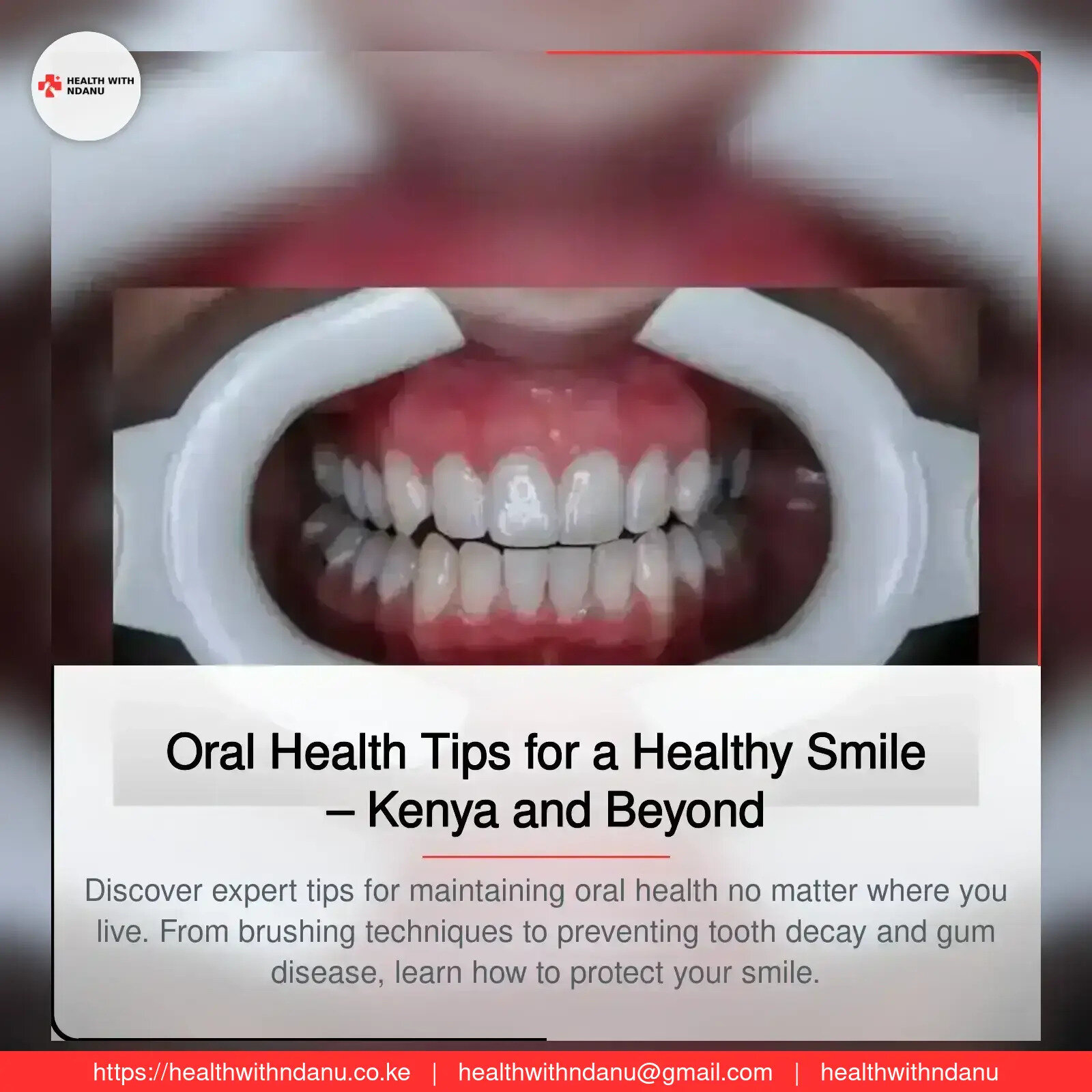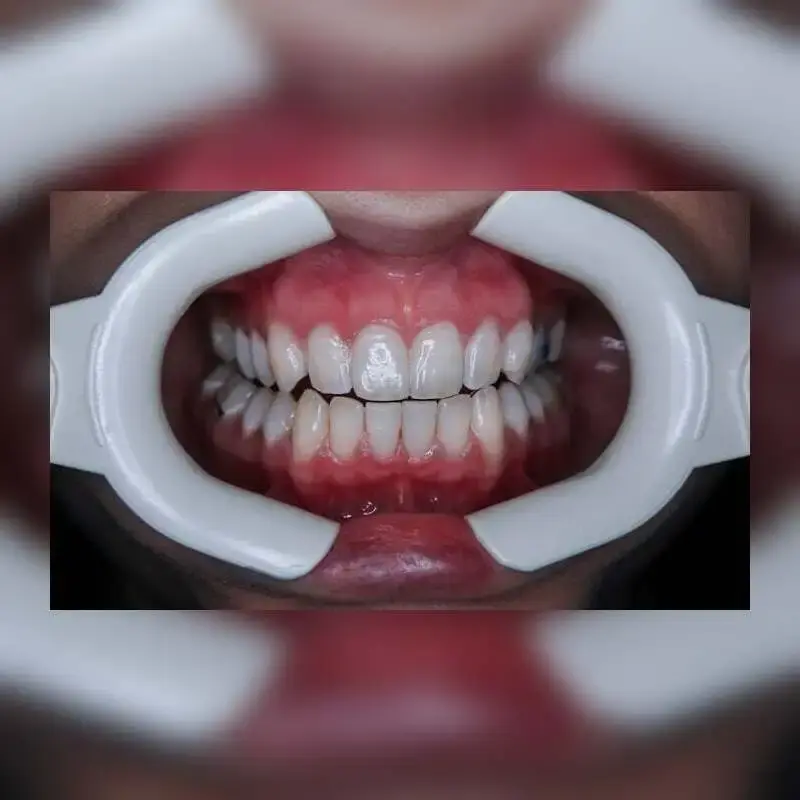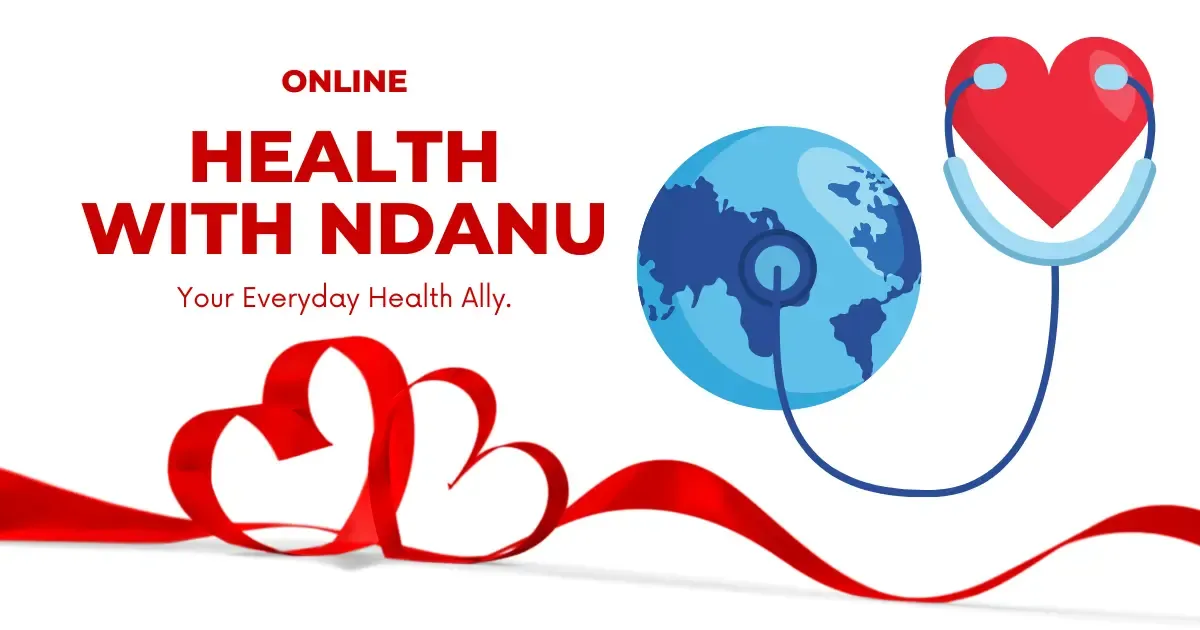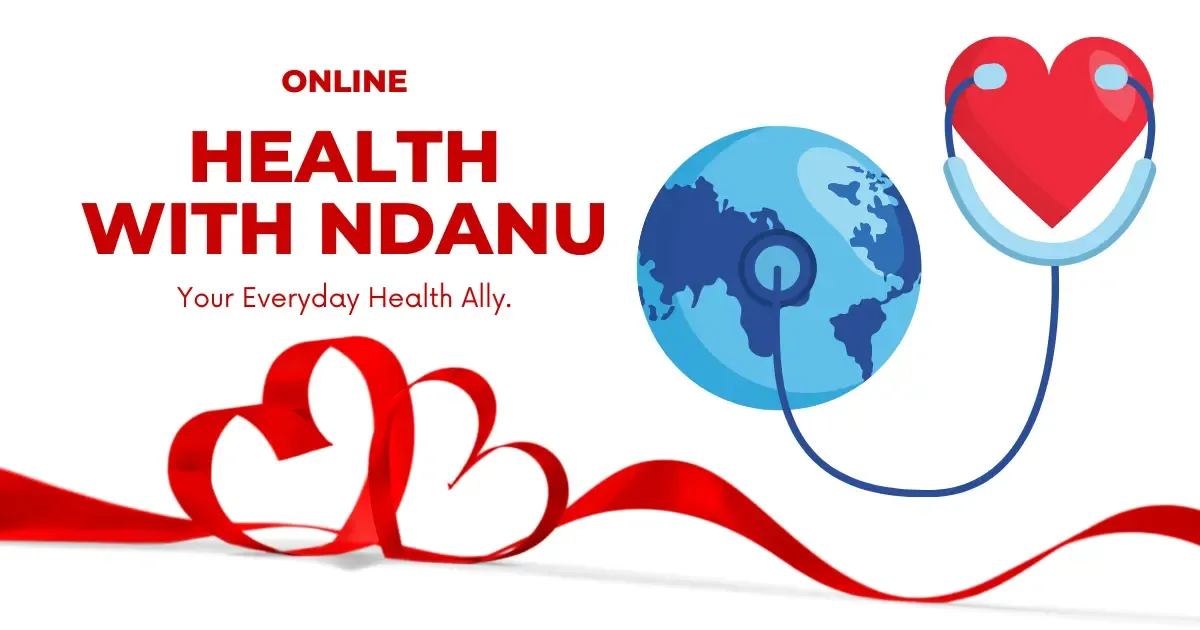Oral Health Tips for a Healthy Smile – Kenya and Beyond



Smile Bright: A Global Guide to Better Oral Health
Let’s face it—oral health isn’t always top of mind… until something hurts. Whether you're in Kenya, Nigeria, the UK, the US, or anywhere in between, most of us only think about our teeth when there’s pain, swelling, or that annoying sensitivity. But here’s a friendly reminder: oral health is health.
Your mouth is the gateway to your body. Taking care of it means protecting your heart, your digestion, your confidence, and your overall well-being. So today, let’s talk about simple, everyday habits that will help you protect your smile—wherever you are in the world.
What Is Oral Health and Why Does It Matter?
When people hear “oral health,” many instantly think of white teeth and minty breath. But oral health is so much more than just a bright smile.
It refers to the overall health of your mouth, including:
- Teeth – for chewing, speaking clearly, and maintaining facial structure.
- Gums – they support your teeth and protect underlying bone.
- Tongue – essential for tasting, swallowing, and speech.
- Inner cheeks – help with chewing and protect sensitive tissues.
- Palate (roof of the mouth) – separates your mouth from your nasal passages and helps in speech and eating.
These parts work together as a system. When one part is unhealthy, it can affect the rest—and even impact other parts of your body.
Why Is Oral Health So Important?
Because your mouth is the entry point to your digestive and respiratory tracts, any bacteria that linger in your mouth can travel to other parts of your body. If your oral hygiene is poor, it can lead to serious infections or worsen existing conditions.
Research shows that poor oral health is linked to:
- Heart disease
- Diabetes
- Respiratory infections
- Pregnancy complications
- Low birth weight in newborns
This means brushing your teeth isn't just about vanity—it’s a lifesaving habit.
What Happens When You Neglect Oral Health?
Let’s talk about the common problems people face when oral hygiene takes a back seat:
1. Tooth Decay (Cavities)
Caused by plaque—a sticky film of bacteria that forms when sugar meets your saliva. These bacteria produce acid that wears down your enamel, leading to holes in your teeth.
2. Gum Disease (Gingivitis & Periodontitis)
When plaque isn't removed, it hardens into tartar and inflames the gums. This leads to bleeding, swelling, and eventually tooth loss if untreated. Gum disease is the leading cause of adult tooth loss worldwide.
3. Halitosis (Bad Breath)
Often caused by decaying food particles, bacteria buildup, or untreated dental issues. It’s not just embarrassing—it could be a red flag for underlying oral infections.
4. Tooth Loss
Losing teeth doesn’t only affect your smile; it also affects your ability to eat, speak, and chew properly. It can lead to malnutrition and social withdrawal.
5. Oral Infections and Oral Cancer
From mouth ulcers to fungal infections and oral cancers, these serious conditions can develop silently without regular dental checkups.
The Global Picture: A Wake-Up Call
According to the World Health Organization (WHO), 3.5 billion people globally suffer from oral diseases. That’s nearly half of humanity. And the most vulnerable populations—children, the elderly, and low-income communities—bear the greatest burden.
The saddest part? Most of these conditions are 100% preventable with basic oral hygiene practices and regular dental care.
Yet many people around the world still lack access to:
- Affordable dental services
- Proper oral hygiene products
- Accurate information about oral health
So, What Can You Do?
Taking care of your oral health doesn’t have to be complicated or expensive. Daily actions like brushing, flossing, eating a balanced diet, and seeing a dentist once or twice a year can make a world of difference.
When you prioritize your mouth, you're not just protecting your smile—you're safeguarding your overall health, your confidence, and your quality of life.
Common Oral Health Challenges Around the World
Oral health is a universal concern, but how it plays out varies widely depending on where you live. From urban centers with modern clinics to rural communities with no dental professional in sight, access and awareness differ across regions.
Yet despite the diversity in culture, economy, and lifestyle, many of us are facing the same oral health challenges—just packaged differently.
Let’s take a closer look at how this plays out around the globe:
Kenya and Sub-Saharan Africa: Limited Access, Low Awareness
In Kenya and across much of sub-Saharan Africa, the biggest oral health challenge is access. While urban areas may have dental clinics and trained professionals, rural communities often go without basic dental care for years.
Key challenges include:
- High cost of treatment, especially in private clinics
- Shortage of trained dental professionals in remote areas
- Limited awareness about preventive oral care
- Use of home remedies or self-treatment for toothaches
- Late presentation—many people only seek help when the pain is severe or an infection spreads
Public hospitals offer dental services, but long wait times and lack of supplies are common. NGOs and mobile dental clinics are trying to bridge the gap, but the need far outweighs the resources available.
United States and United Kingdom: Lifestyle and Diet-Related Decay
In high-income countries like the U.S. and U.K., the story is different—but the outcome is often the same. Despite easy access to toothbrushes, toothpaste, and dental clinics, many people suffer from tooth decay and gum disease due to lifestyle choices.
Major contributors include:
- Diets high in sugar—sodas, snacks, and processed foods
- Stress and anxiety, which lead to teeth grinding (bruxism) and neglect of oral care
- Smoking and alcohol use, both linked to gum disease and oral cancers
- Busy schedules that lead to skipped dental visits or rushed brushing habits
- Over-reliance on cosmetic fixes (like whitening) rather than focusing on overall oral health
Ironically, some of the most advanced countries are facing what experts call a “silent oral health epidemic” due to poor habits and unhealthy diets.
Asia: Cultural Habits and Urban-Rural Divide
Asia is a continent of contrasts. While countries like Japan and South Korea boast some of the best oral health stats globally, others struggle with deeply rooted habits that put oral health at risk.
In many parts of South and Southeast Asia, challenges include:
- Widespread chewing of betel nut, tobacco, or khat—linked to oral cancer and tooth decay
- High rates of smoking, especially among men
- Limited access to dental care in rural or densely populated urban slums
- Low public investment in preventive dental education
In countries like India, China, and Indonesia, urban populations are beginning to embrace dental check-ups and orthodontics, but rural areas still face huge disparities.
Latin America: Progress With Persistent Inequities
Countries in Latin America—like Brazil, Mexico, and Colombia—have made significant strides in improving public dental health. Brazil, for example, has one of the largest public dental health programs in the world.
Still, challenges remain, especially in remote or low-income communities:
- Access to services is still a barrier in rural areas
- Public dental clinics are often overwhelmed and underfunded
- Nutritional habits, like frequent sugary drinks or snacks, contribute to cavities
- Preventive care is not yet a cultural norm in some regions
As infrastructure improves, more people are getting the care they need—but equity is still a major issue.
A Global Problem with Local Flavors
From dental anxiety in developed countries to lack of toothbrushes in under-resourced areas, oral health problems may wear different faces, but they stem from shared roots:
- Inadequate awareness about preventive car
- Economic and systemic barriers to treatment
- Dietary and cultural factors that increase risk
- Delayed care-seeking behavior due to fear or cost
- No matter where you live—Nairobi or New York, Lagos or London, Mumbai or Mexico City—your mouth matters.
Why Global Oral Health Deserves Attention
Here’s a global truth: oral diseases are among the most common noncommunicable diseases (NCDs) worldwide. They affect all age groups and can lead to pain, disability, missed school or work, and poor quality of life.
By acknowledging the unique challenges faced in each region, we can work toward better awareness, policy change, and access to care on a global scale.
Because a world where everyone has the right to smile without pain is a world worth working toward.
Are You Making These Oral Hygiene Mistakes?
Let’s be honest—oral hygiene isn’t always as straightforward as it seems. Many of us believe we’re doing enough by brushing our teeth every morning. But in reality, small habits and common oversights can silently sabotage your oral health.
If you've ever rushed your brushing or skipped a dental appointment (guilty!), you’re definitely not alone.
Here are some of the most common oral hygiene mistakes people make around the world—and what you can do to fix them.
1. Brushing Only Once a Day — or Too Quickly
Brushing your teeth once a day might seem better than nothing, but it's not enough. Plaque builds up constantly, and if not removed, it turns into tartar and invites cavities and gum disease.
Brushing too quickly—say, under a minute—is also a mistake. It takes at least two minutes to properly clean all surfaces of your teeth.
What to do instead:
- Brush twice a day—morning and night
- Use a timer or play a short song to help hit the 2-minute mark
- Use small, gentle circular motions, reaching all sides of every tooth
2. Skipping Flossing (Yes, It Still Matters!)
Flossing often feels like an "optional extra"—but it’s actually just as important as brushing. Your toothbrush can’t reach the tight spaces between your teeth where food and plaque love to hide.
Skipping flossing leads to gum irritation, bad breath, and eventually—gum disease.
What to do instead:
- Floss once a day, preferably at night before brushing
- Use traditional string floss, floss picks, or even a water flosser if that’s easier for you
- Be gentle—don’t snap the floss or force it harshly between teeth
3. Using a Hard Toothbrush
Many people think a hard-bristled brush cleans better. In reality, it can damage your gums and wear down your enamel over time. This can lead to sensitivity, receding gums, and even tooth loss.
What to do instead:
- Use a soft-bristled toothbrush (your gums will thank you)
- Replace your toothbrush every 3–4 months, or sooner if the bristles are frayed
- Use gentle pressure—your brush shouldn’t look flattened after a week
4. Drinking Sugary Drinks Without Rinsing After
Sodas, energy drinks, fruit juices, and even sweetened tea or coffee can be a nightmare for your teeth. Sugar + acid = a breeding ground for tooth decay.
Even worse? Sipping slowly over time (like with iced coffee or soda) exposes your teeth to sugar and acid for longer.
What to do instead:
- Drink sugary beverages in moderation and avoid sipping all day
- Rinse your mouth with plain water afterward to neutralize acids
- Use a straw to reduce contact with your teeth
- Wait at least 30 minutes before brushing after acidic drinks to avoid enamel erosion
5. Ignoring Bleeding Gums or Oral Pain
Do your gums bleed when you floss or brush? Do you have a recurring toothache or a sore spot in your mouth?
Ignoring these signs is a huge mistake. Bleeding, swelling, or persistent pain is your body’s way of saying something’s wrong—don’t ignore it!
What to do instead:
- Don’t brush off bleeding gums—it could be gingivitis or even periodontitis
- Make an appointment with your dentist to get it checked
- Early treatment can prevent bigger, more painful (and expensive) problems later
6. Postponing Dental Visits Due to Fear or Cost
This is one of the most common global challenges. Dental anxiety and high treatment costs are real barriers, especially in places where public dental services are limited.
But here’s the truth: Skipping dental visits often leads to more serious issues that are costlier and more painful to fix.
What to do instead:
- Aim for at least one dental check-up every 6–12 months
- Look for low-cost dental clinics, government programs, or community health days if affordability is a concern
- Communicate your fears—many dentists now use gentler tools and techniques to help anxious patients
You're Not Alone—And It's Never Too Late to Improve
If any of these mistakes sound familiar, don’t beat yourself up. Millions of people around the world are in the same boat. The key is learning what’s wrong and taking small, sustainable steps to fix it.
Oral health isn’t about perfection—it’s about consistency and awareness.
Remember: when you take care of your mouth, you're also taking care of your heart, brain, confidence, and overall well-being.
Want to take your oral care to the next level?
Stay tuned for our next section on "Simple, Everyday Habits for a Healthier Smile—No Matter Where You Live!"
Una uzoefu wako? Shiriki nasi
Popular Categories
Mablogu Zinazobambwa Sana
Daily Newsletter
Get all the top stories from Blogs to keep track.



